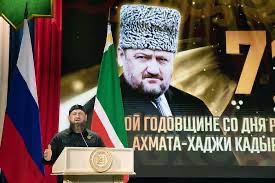We, the People
During the Ottoman coup of 1913 Enver Bey demanded the Grand Vizier (Prime Minister) Kamil Pasha to write a letter of resignation
- At the suggestion of the military… - Kamil Pasha started
- … and the people, - corrected Enver
- … and the people, - added Kamil
During the Ottoman coup of 1913 Enver Bey demanded the Grand Vizier (Prime Minister) Kamil Pasha to write a letter of resignation
- At the suggestion of the military… - Kamil Pasha started
- … and the people, - corrected Enver
- … and the people, - added Kamil

“The People” = an abstraction legitimizing the will of an interest group. Enver just can’t walk around giving orders by the name of sweet himself. No, he will be giving orders by someone else’s name
“The People” will suffice
“The People” will suffice

Someone else could be speaking on behalf of God...
... Or a dead ancestor (a more Lindy choice, I think). Consider Kadyrov. The current ruler of Chechnya Ramzan is building a massive cult of personality of his father Ahmad, rather than of himself. The posters with Ahmad are everywhere. Everything is named in honour of Ahmad 

Speaking on your own behalf = weak
Speaking on a dead ancestor's behalf = powerful
The ancestor is dead, won't say or do anything, so he is nothing more than an abstraction legitimising whatever you do
Build an ancestral cult -> Then borrow a symbolic power from it
Very smart
Speaking on a dead ancestor's behalf = powerful
The ancestor is dead, won't say or do anything, so he is nothing more than an abstraction legitimising whatever you do
Build an ancestral cult -> Then borrow a symbolic power from it
Very smart

Legitimising your rule through the appeal to something larger than yourself is a necessity. Unless you wanna be hated
As Guizot pointed out, the despotic monarchies or theocracies were often popular among their subjects. Whereas the feudal despotism was always universally hated
As Guizot pointed out, the despotic monarchies or theocracies were often popular among their subjects. Whereas the feudal despotism was always universally hated

A man exercising power by the name of idea (monarchy/theocracy) can be often acceptable or popular
A man exercising power by the name of himself (feudal) is always hated
Therefore, a rational ruler will find/create an abstraction to speak on its behalf
gallica.bnf.fr/ark:/12148/bpt…
A man exercising power by the name of himself (feudal) is always hated
Therefore, a rational ruler will find/create an abstraction to speak on its behalf
gallica.bnf.fr/ark:/12148/bpt…

I quoted the Enver Bey vs Kamil Pasha dialogue by memory, but it is basically from this book, which I absolutely recommend. Enjoyed it very much 

• • •
Missing some Tweet in this thread? You can try to
force a refresh





